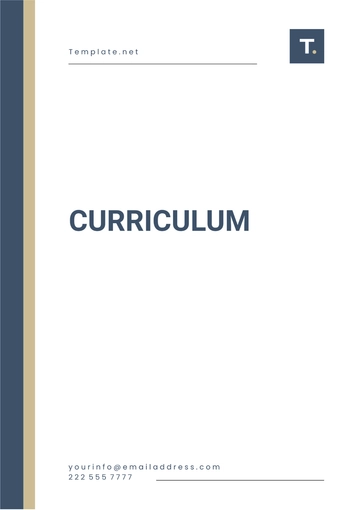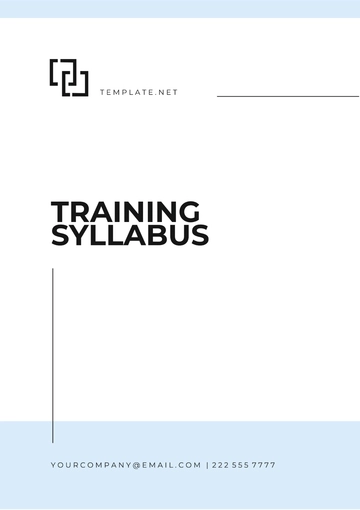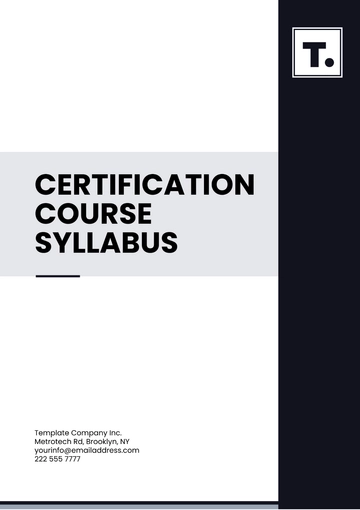Free Actuarial Syllabus

[COURSE TITLE] COURSE
Course Title | [COURSE TITLE] |
Course Code | [COURSE CODE] |
Course Duration | [NUMBER OF WEEKS] |
Instructor Name | [YOUR NAME] |
[YOUR EMAIL] | |
Class Location | [CLASS LOCATION] |
Class Time | [CLASS TIME] |
1. Course Description
This course provides comprehensive coverage on actuarial mathematics and risk management principles. Students will gain theoretical and practical knowledge in areas such as life contingencies, risk models, derivatives pricing, and more, which are essential components of the actuarial profession.
2. Instructor Information
Instructor: [YOUR NAME]
Email: [YOUR EMAIL]
Organization: [YOUR COMPANY NAME]
3. Learning Objectives
Understand the fundamentals of actuarial mathematics.
Apply risk management theories in practical scenarios.
Develop basic knowledge in derivatives pricing.
Analyze different types of risks using appropriate models.
Understand life contingencies and their applications in insurance.
4. Course Schedule
Week | Topic | Reading |
|---|---|---|
1 | Basics of Actuarial Mathematics | Chapter 1: Basics of Actuarial Mathematics |
2 | Probability Basics | Chapter 2: Probability Theory Fundamentals |
3 | Probability Distributions | Chapter 3: Probability Distributions |
4 | Financial Mathematics | Chapter 4: Financial Mathematics |
5 | Annuities and Loans | Chapter 5: Annuities and Loans |
6 | Life Contingencies | Chapter 6: Life Contingencies |
7 | Survival Models | Chapter 7: Survival Models |
8 | Pension Mathematics | Chapter 8: Pension Mathematics |
9 | Risk Management | Chapter 9: Risk Management |
10 | Credibility Theory | Chapter 10: Credibility Theory |
5. Required Reading and Materials
Theory of Risk and Stochastic Processes
Actuarial Mathematics for Life Contingent Risks
Insurance Risk and Ruin
Stochastic Models in Life Insurance
Financial Risk Management: A Practitioner's Guide to Managing Market and Credit Risk
6. Assignments and Assessments
Weekly Assignments: To assess understanding of weekly course topics.
Midterm Examination: To evaluate progress midway through the course.
Final Examination: To evaluate mastery of course material.
Group Projects: To encourage collaborative problem-solving using course principles.
Case Studies: To provide real-world applications of actuarial science.
7. Course Policy
All assignments must be submitted by due dates. Late submissions will be penalized.
Examinations must be taken at scheduled times, unless justified by extenuating circumstances.
Group project participation is mandatory and will be part of the final grade.
Academic dishonesty is not tolerated and will result in course failure.
Attendance at lectures is strongly recommended for course understanding.
8. Grading Policy
Grades will be assigned based on written assignments, group projects, midterm exam, case studies, and final exam. Details of the grading breakdown will be provided in the course.
9. Disclaimer
The syllabus for this course is not set in stone and may undergo changes. The pace at which the class is able to assimilate and understand the course content, the availability of necessary resources needed for successful teaching and learning, as well as other unpredictable factors, can impact the structure and content of the syllabus. In the event that changes are deemed necessary, these amendments will be communicated to all involved parties promptly and efficiently to avoid confusion and promote clear understanding.
- 100% Customizable, free editor
- Access 1 Million+ Templates, photo’s & graphics
- Download or share as a template
- Click and replace photos, graphics, text, backgrounds
- Resize, crop, AI write & more
- Access advanced editor
Introducing the Actuarial Syllabus Template from Template.net. Tailored for precision and efficiency, it's fully editable and customizable to suit your specific needs. Seamlessly craft your syllabus with ease using our Ai Editor Tool. Elevate your planning process effortlessly with this comprehensive resource.





























